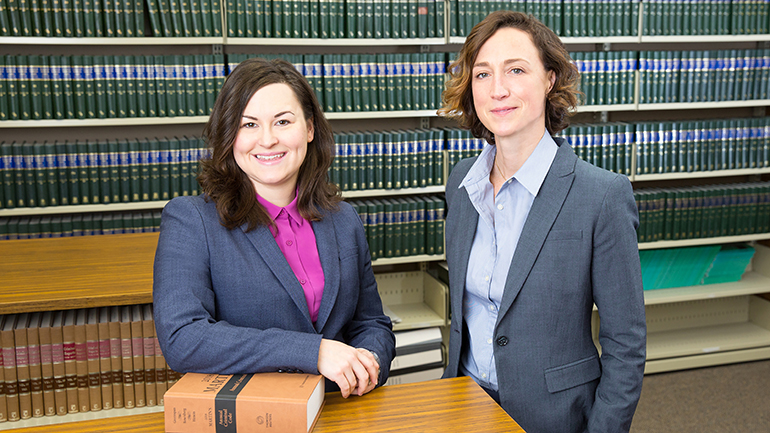Sexual assault
Sexual assault attorneys a positive step for Nova Scotia: Avalon
Constance MacIsaac, Danielle Fostey to handle sex assault cases and training

caption
Constance MacIsaac and Danielle Fostey will take charge on sexual assault prosecutions and training for Crown attorneys in Nova Scotia.
caption
Crown attorneys Constance MacIsaac and Danielle Fostey will specialize in sexual assault cases.A local sexual assault resource centre is hopeful for its clients, following Nova Scotia’s appointment of two specialized Crown attorneys.
Jackie Stevens, executive director at the Avalon Sexual Assault Centre in Halifax, said these appointments, announced last Thursday, are a step in the right direction.
“In some (sexual assault) cases, the victim doesn’t feel prepared, or even that their case is being taken seriously, because the attorney doesn’t have enough time or the adequate resources or proper knowledge of sexual assault law,” said Stevens. “The addition of these two specialized Crowns makes us hopeful that our concerns will be addressed.”
The province has appointed Constance MacIsaac and Danielle Fostey to these positions. They will be in charge of conducting cases, as well as training other Crown attorneys in the special practices required for dealing with sexual assault.
“We know that barriers exist,” said Stevens. “There are laws in place that aren’t always getting practiced to the fullest, but it’s up to the Crown and the judges to ensure that they are.”
Nova Scotia currently has 95 Crown attorneys. In 2017 the province saw 40,000 new criminal cases, 424 of which were sexual assault.
What makes sexual assault cases different?
Chris Hansen, spokesperson for the Nova Scotia Public Prosecution Service, said sexual assault cases come with a unique set of challenges. She said most of the offences occur in private without witnesses, impairment or intoxication are common factors and determining a person’s capacity to consent is a difficult task.
“(The attorneys) are also battling incorrect stereotypes and rape myths,” said Hansen. “And on top of everything, they’re dealing with individuals who have been traumatized.”
Stevens said the existence of trauma is an important factor for the Crown to consider. She’s seen cases where victims were asked to talk about past sexual trauma or had to face their abuser. Actions like that are contrary to Canada’s Rape Shield Laws, which were written into the sexual assault section of the Criminal Code to avoid re-traumatizing victims.
While those kinds of actions are harmful, Stevens believes they aren’t done out of malice.
“It’s not that the current Crowns can’t (handle the cases) but because there have just been such high caseloads they can’t dedicate the time,” she said. “Hopefully, having special Crowns who are dedicated and can support others will make a difference.”
What’s next?
Hansen said the Crown appointments are complementary to goals set by Nova Scotia in its sexual violence strategy, but there’s still room for improvement. The strategy, which is aimed at creating an environment in which victims feel comfortable reporting their assaults, was launched in 2015. It also addresses the continuously high rates of sexual assault in the province.
Stevens agreed that more can be done in the province. She thinks the strategy of employing specially certified prosecutors should be implemented at all levels of the criminal justice system: from police to defence and Crown attorneys to judges.
“There continues to be gaps in support at the community level, and we know there is a need for specialized legal services,” she said. “But going to trial should not be the only access to justice; there need to be more options in place.”

